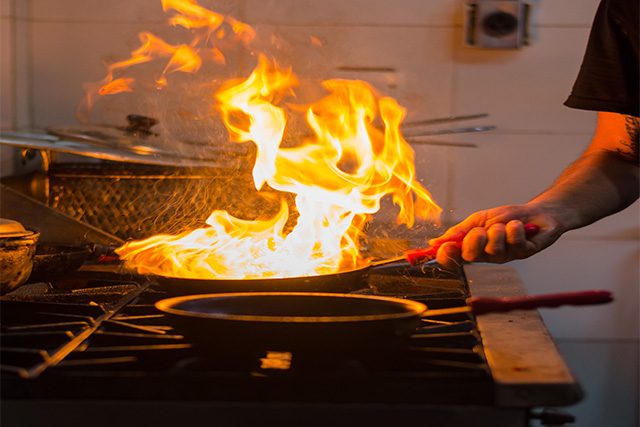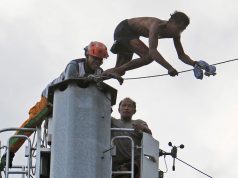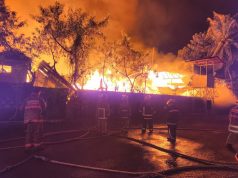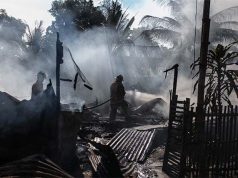The Bureau of Fire Protection (BFP) listed electrical connections and open flames as among the country’s most common causes of fires.
One of the parts of the house prone to fires is the kitchen where food is cooked over a fire.
There are electrical appliances and gas leaks may also occur.
Here are some common causes of kitchen fires and how we can prevent them from happening:
Fire caused by cooking oils and grease
One can avoid blaze caused by grease by keeping the cooking surfaces clean.
Oils spatter when you cook your favorite fried foods, covering your stove and kitchen counters with grease. An easy way to clean your stovetop is to wipe it down with a mix of baking soda salt, and dish soap.
Meanwhile, stove grates and burners can be washed or soaked with hot water and soap.
While the most common practice is putting out fire with water, sometimes that is not the case.
In some cases, the first thing to do is turn off the burner first.
Oxygen encourages fire so deplete it by covering your cooking pan with a metal lid. Glass lids are discouraged as it can shatter from the heat and you are advised to use mitts before touching any of the scalding hot items.
Sometimes, you can also use a lot of baking soda to smother small flames, but never use flour as it can worsen things.
However, these steps are only meant for small fires.
For blaze that are out of one’s control, calling for professional help is a must coupled by immediate evacuation.
Electrical fire from kitchen appliances
Electrical fires happen inside appliances – microwave ovens, toasters and the like.
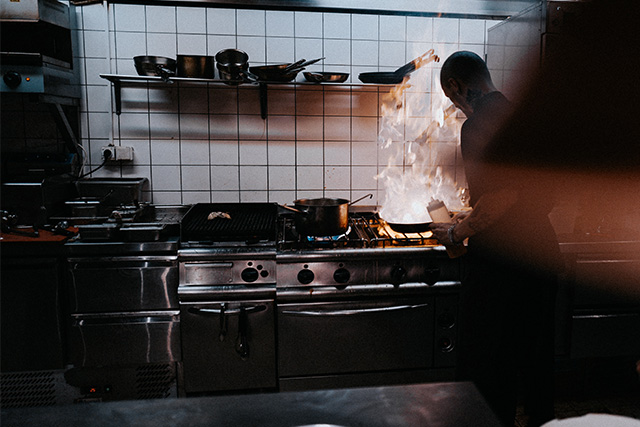
In cases like these, the appliance door must be closed and cut off the fuel source by unplugging the appliance.
Since electricity is involved, use of conductors such as water to extinguish the fire is also discouraged.
To prevent electrical fires from happening again, appliance owners are advised to get their equipment razed by fire checked and repaired before attempting to use it again. The fire may have damaged some parts and made it more dangerous.
Electrical fires could also be prevented by making sure that your appliances are installed correctly and maintained regularly. Unplugging these when not in use is encouraged, as well as keeping water away from sockets and plugs at all times.
Fire or explosion ignited by gas leaks
A small gas leak in your liquefied petroleum gas, if not tended to immediately, can fill the kitchen with flammable gas.
Once a heat source is turned on – be it a lighter, a match, or a burner – fire will catch and spread quickly. If you detect a gas leak, you are advised to open doors and windows fully to let the gas out and call a professional to handle it for you.
Fires caused by gas leaks are usually too big to put out on your own, so it is best to evacuate and seek help.
The best way to prevent LPG accidents is to buy only quality kitchen fuel.
Solane earlier reported that there are many illegal sellers of fake LPG that can cause the very explosions you’re trying to avoid. It advised its consumers to purchase from authorized distributors.

The gas supplier inspects all their tanks thoroughly to make sure that there are no gas leaks It also weighs its tanks and practice seven-point safety check upon delivering and installing your tank – you’ll never get a cylinder with less LPG than promised, unlike with illegal refillers.
In 2019, the Association of Safety Practitioners of the Philippines and the BFP reported that exploding LPGs remains to be one of the top five causes of fires across the country.
READ: ‘Matter of life and death’: Gas supplier warns public against fake tanks
Other ways to prevent kitchen fires
While there are several kinds of fires, there are also different types of fire extinguishers.
For the kitchen, the most common ones to have ready is Class B for flammable liquid and gas fires and Class C for electrical fires. Invest in these extinguishers and place them in an accessible area.
Setting up a fire alarm system and creating an evacuation plan is another good fire prevention practice.
For residential or commercial buildings, tenants should be familiar with the emergency protocols. —Rosette Adel

